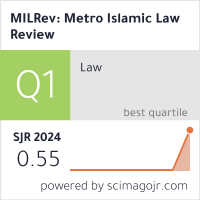Human Trafficking and the Relevance of Hifz al-nafs and Hifz al-’ird in Contemporary Islamic Legal Ethics
DOI:
https://doi.org/10.32332/milrev.v4i1.10694Keywords:
Human trafficking, Maqasid al-Shariah, Hifz al-Nafs, Hifz al-’ird.Abstract
Human trafficking is a profound moral crisis in today’s world, threatening human dignity and fundamental rights on a wide scale. This study explores the issue through the lens of Islamic legal ethics, focusing on the reinterpretation of hifz al-nafs (protection of life) and hifz al-’ird (protection of honor) within the framework of Maqasid al-shari’ah (the higher objectives of Islamic law). Using a normative-critical approach and drawing from both classical and contemporary sources, the research rethinks these two core principles to better respond to the complex realities of human trafficking, which often involves violence, exploitation, and human rights violations. The findings show that hifz al-nafs should not be limited to physical safety but must include psychological, social, and emotional well-being. Similarly, hifz al-’ird must go beyond the narrow notion of personal honor to protect human dignity, moral integrity, and the right to freedom from abuse. The study argues that classical Islamic legal thought needs to be revisited and updated to meet the moral and legal challenges posed by human trafficking today—by incorporating principles of justice, compassion, and human rights. This research makes an academic contribution by re-conceptualizing Maqasid al-shari’ah, especially in hifz al-nafs and hifz al-’ird, enriching the discourse on Islamic legal ethics in addressing modern social issues. It also provides a stronger theoretical basis for contemporary fiqh reform and encourages critical engagement between traditional Islamic texts and today’s ethical realities. Ultimately, this study offers a valuable reference for developing more humane, responsive, and justice-oriented Islamic legal frameworks to protect victims of human trafficking.
Downloads
References
Agoi, Moses Adeolu, Zohaib Hassan Sain, dan Oluwanifemi Opeyemi Agoi. “Integrating Technology in the Fight Against Human Trafficking: Challenges, Opportunities, and Social Implications.” Journal of Social Studies and Education 2, no. 1 (2024): 57–69. https://doi.org/10.61987/jsse.v2i1.452.
Alkharji, Abdulatif Abdullah S. “Human Trafficking and Islamic Law.” Journal of Law, Policy and Globalization 131, no. 0 (2023): 13.
Asa’ari, Asa’ari, Zufriani Zufriani, Arzam Arzam, dan Doli Witro. “Urgensi Pemahaman Terhadap Maqashid Al-Syari’ah Dan Perubahan Sosial Dalam Istinbath Al-Ahkam.” De Jure: Jurnal Hukum Dan Syar’iah 13, no. 2 (31 Desember 2021): 222–239. https://doi.org/10.18860/j-fsh.v13i2.13818.
Aslati, A. Agustar, Silawati, Arisman, dan S. Arafah. “Utilizing Science and Maqasid al-shari’ah in Resolving Contemporary Issues of Islamic Family Law.” Al-Manahij: Jurnal Kajian Hukum Islam 18, no. 1 (2024): 17–36. https://doi.org/10.24090/mnh.v18i1.10571.
Auda, J. “A maqāsidī approach to contemporary application of the Sharī’ah.” Intellectual Discourse 19, no. 2 (2011): 193–217.
Bungin, Burhan. Analisis Data Penelitian Kualitatif. Jakarta: PT Raja Grafindo Persada, 2003.
Elfia, N. Shalihin, Surwati, Y. Fajri, dan A. Rahmat. “Institutionalizing maqāsid hifz al-nasl within the Minangkabau inheritance framework.” Ijtihad: Jurnal Wacana Hukum Islam dan Kemanusiaan 24, no. 2 (2024): 193–222. https://doi.org/10.18326/IJTIHAD.V24I2.193-222.
Faisal, F. Mu’in, R.N. Edi, dan R. Santoso. “A Review of Maqâshid Sharîa on Handling the COVID-19 Pandemic in Lampung and West Java Province.” Al-’Adalah 21, no. 1 (2024): 221–244. https://doi.org/10.24042/adalah.v21i1.21796.
Farida, Umma, Istianah Istianah, dan Abdurrohman Kasdi. “Human Trafficking In The Perspective Of Islam And Feminism And Its Prevention Efforts In Indonesia.” PALASTREN: Jurnal Studi Gender 17, no. 2 (13 Januari 2025): 145–170. https://doi.org/10.21043/palastren.v17i2.28325.
Fatah, Ahmad. “Trafficking Dalam Pandangan Hukum Pidana Islam.” Jurnal Kajian Islam Interdisipliner 1, no. 1 (2016). https://doi.org/10.14421/jkii.v1i1.1058.
Firdaus, Firdaus, Mursal, Syaflin Halim, Desminar, dan Fery Ramadhansyah. “The Indo-Pacific Child Trafficking Dynamics: Islamic and Cultural Viewpoints.” KARSA Journal of Social and Islamic Culture 31, no. 2 (24 Desember 2023): 202–245. https://doi.org/10.19105/karsa.v31i2.12391.
Fuad, Moh Fahimul. “Asy-Syatibi Dan Konsep Istiqra’ Ma’nawi.” As-Salam: Jurnal Studi Hukum Islam & Pendidikan 1, no. 1 (16 April 2012): 1–22. https://doi.org/10.51226/assalam.v1i1.21.
Hafizhah, Imam Kamaluddin Azzah. “Trafficking in the Perspective of Islamic Law and the Draft Criminal Code.” Ijtihad 12, no. 2 (10 September 2018): 173–192. https://doi.org/10.21111/ijtihad.v12i2.3024.
Harahap, Sayla Ar Rahmah Hafiidzah, dan Indra. “Human Trafficking In The Islamic View (Comparative Study Of Al-Azhar And Al Misbah Interpretation).” Academy of Education Journal 15, no. 2 (11 November 2024): 1699–1707. https://doi.org/10.47200/aoej.v15i2.2637.
Harun, M., Fauziah, M.S. Is, A.B.B. Mohamad, dan A.H. Syawqi. “The Ideal Legal Protection of the Child Labor Rights in Indonesia: The Dimensions of Maqasid al-shari’ah and the Welfare State.” Juris: Jurnal Ilmiah Syariah 23, no. 1 (2024): 167–178. https://doi.org/10.31958/juris.v23i1.10537.
Ibrahim, A.M. “Islamic law-ethics and the struggle against slavery and human trafficking.” Dalam Human Flourishing: The End of Law: Essays in Honor of Siegfried Wiessner, 448–481, 2023. https://doi.org/10.1163/9789004524835_015.
Insani, N., S.S. Karimullah, dan Sulastri. “Islamic Law Challenges in Addressing Human Trafficking and Sexual Exploitation.” Jurnal Hukum Islam 21, no. 2 (2023): 357–387. https://doi.org/10.28918/jhi_v21i2_06.
Khotimah, Umi Khusnul. “Islamic Legal Analysis on the Protection of Vulnerable Age Groups from Online Gender-Based Violence (OGBV) in Indonesia.” Journal of Ecohumanism 3, no. 8 (16 Desember 2024): 7184–7193. https://doi.org/10.62754/joe.v3i8.5349.
Mashuri, I. Nur, dan M. Ngizzul Muttaqin. “Maqasid Sharī’ah Flexibility to Overcome COVID-19 in Indonesia: From Government Policies to Fatwā of Council of Indonesian Ulema (MUI), Nahdlatul Ulama (NU), and Muhammadiyah.” De Jure: Jurnal Hukum dan Syar’iah 13, no. 2 (2021): 240–263. https://doi.org/10.18860/j-fsh.v13i2.13280.
Masyhuri, dan Fadhilah Khunaini. “Relevansi Hukum Islam Dalam Dinamika Kontemporer: Analisis Kontekstual Terhadap Prinsip Maqashid al-Shariah.” Jurnal Pemikiran Dan Ilmu Keislaman 7, no. 1 (15 Maret 2024): 38–54.
Miles, Matthew B, dan A. Michael Huberman. Analisis data kualitatif : buku sumber tentang metode-metode baru. Jakarta: Universitas Indonesia Press, 2014.
Mustafid, Fuad. “Perdagangan Orang Dalam Perspektif HAM Dan Filsafat Hukum Islam.” Al-Ahkam 29, no. 1 (8 April 2019): 85–108. https://doi.org/10.21580/ahkam.2019.29.1.3134.
Nor, Aishah Mohd, Zuraini Ab Hamid, dan Lokman Effendi Ramli. “Human Trafficking from the Islamic Perspective.” International Journal of Religion 5, no. 7 (10 Mei 2024): 501–514. https://doi.org/10.61707/g9xw9y85.
Nurhayati, Nurhayati, Muhammad Syukri Albani Nasution, Reni Ria Armayani Hasibuan, dan Hazrul Afendi. “Human Trafficking in the Perspective of Maqashid Al-Sharia.” Jurnal Ilmiah Islam Futura 22, no. 2 (13 Agustus 2022): 150–163. https://doi.org/10.22373/jiif.v22i2.12304.
Putra, Gilang Rizki Aji. “Human Trafficking Menurut Perspektif Hukum Islam.” ADALAH 6, no. 6 (21 Juli 2022): 1–10. https://doi.org/10.15408/adalah.v6i6.27259.
Qosim, N.H., S.S. Muhammed, R.F. Ftayh, M. Zuhair, dan J.K. Kabrch. “Examining Legislation and Enforcement Mechanisms to Combat International Human Trafficking from an Islamic Criminal Law Perspective.” Al-Istinbath: Jurnal Hukum Islam 10, no. 1 (2025): 251–279. https://doi.org/10.29240/jhi.v10i1.12544.
Rahmawati, Syahdila Nur. “Tindak Pidana Human Trafficking Perspektif Hukum Pidana Islam.” Ma’mal: Jurnal Laboratorium Syariah Dan Hukum 4, no. 3 (29 Juni 2023): 256–272. https://doi.org/10.15642/mal.v4i3.246.
Rashdi, Saber. “Islamic Law and Human Trafficking: The Ethical and Legal Frameworks.” Al-Ahkam: Jurnal Ilmu Syari’ah Dan Hukum 9, no. 1 (4 November 2024): 47–60. https://doi.org/10.22515/alahkam.v9i1.7824.
Rismilda, Nela Aprilia. “The Relationship between Islamic Law and the Concept of Gender Equality Based on Maqasid Sharia Perspective.” Sinergi International Journal of Law 1, no. 3 (27 November 2023): 175–183. https://doi.org/10.61194/law.v1i3.90.
Sinaga, Hasudungan. “Restitution in Social Reintegration of Human Trafficking Victims: An Islamic and Indonesian Criminal Law Perspective.” Fikri : Jurnal Kajian Agama, Sosial Dan Budaya 9, no. 2 (11 September 2024): 182–199. https://doi.org/10.25217/jf.v9i2.4918.
Subli, M., D. Syamsuddin, A.R. Muhammad, A.W. Rahim, dan Sulaiman. “Green Investment in Contemporary Islamic Perspective: A Maqasid al-Syari‘ah Analysis of the Mining Industry in Morowali.” MILRev: Metro Islamic Law Review 4, no. 1 (2025): 156–183. https://doi.org/10.32332/milrev.v4i1.10269.
Syam, S., C. Permata, R.M. Haris, dan M.M. Matondang. “Reevaluating the Legal Status of Monosodium Glutamate Consumption: The Indonesian Ulema Council’s Fatwas and Maqasid al-shari’ah.” Al-Manahij: Jurnal Kajian Hukum Islam 18, no. 2 (2024): 289–302. https://doi.org/10.24090/mnh.v18i2.11121.
Wanto, Deri, Rahmad Hidayat, dan R. Repelita. “Maqasid Shariah Change as Theory: From Classical to Cotemporary Maqasid Shariah.” Al-Istinbath: Jurnal Hukum Islam 6, no. 2 November (11 November 2021): 427–454. https://doi.org/10.29240/jhi.v6i2.3122.
Zahari, Nur Aqila Mohd, dan Mohd Hafiz Safiai. “Maqasid Sharia and the Biomedical Ethics of E-Cigarettes: A Contemporary Islamic Legal Assessment.” MILRev: Metro Islamic Law Review 4, no. 1 (30 Mei 2025): 295–318. https://doi.org/10.32332/milrev.v4i1.10398.
Downloads
Published
Issue
Section
License
Copyright (c) 2025 Bambang Tri Bawono, Moh. Nurul Huda, Ahmad Hadi Prayitno, Moh. Aris Siswanto

This work is licensed under a Creative Commons Attribution-ShareAlike 4.0 International License.










